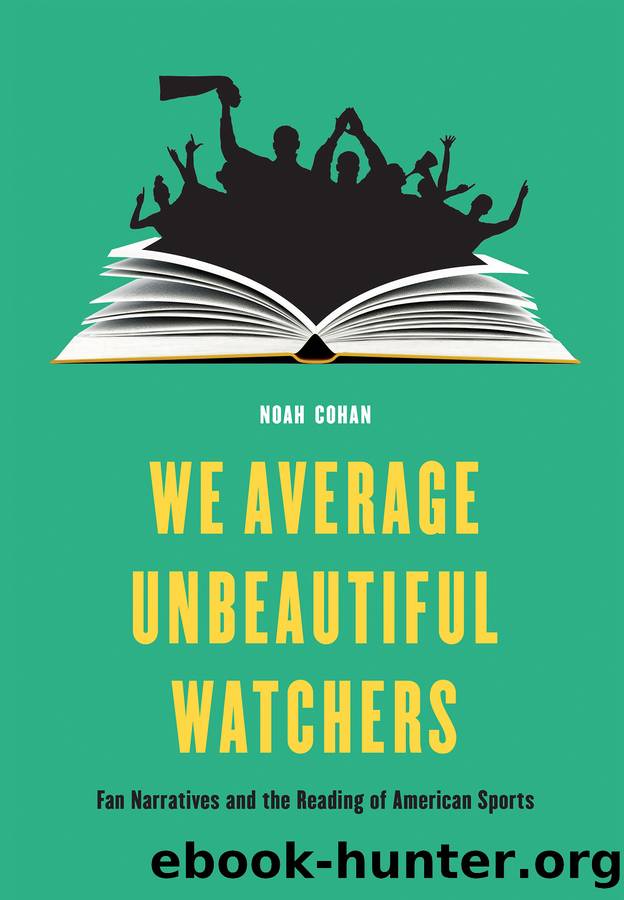We Average Unbeautiful Watchers by Noah Cohan

Author:Noah Cohan [Cohan, Noah]
Language: eng
Format: epub
Tags: SPO066000 Sports & Recreation / Sociology Of Sports, SOC052000 Social Science / Media Studies, SOC022000 Social Science / Popular Culture
Publisher: University of Nebraska Press
Where The Fan offers a fear-mongering portrait of fan investment by taking the fanâs attempts at compensating for his economic emasculation to violent extremes, director Robert D. Siegelâs Big Fan complicates and mitigates the earlier filmâs horrific conclusions. Though it stars a comedian, Patton Oswalt, as the eponymous âbig fanâ of the New York Giants football team, the film is a drama, premised on a violent interaction between a fan and his favorite player. Like DeNiroâs Gil Renard, Oswaltâs Paul Aufiero is portrayed as a feminized, unproductive loserâhe works as a parking garage attendant and lives at home with his aging motherâwhose deep attachment to his favorite team infantilizes him and implies mental instability. And like Renard, Aufiero alters the narrative of that team by personally interacting with its African American star, in this case a linebacker named Quantrell Bishop. But Aufiero renounces his failure to adhere to patriarchal capitalist moral standards in a fundamentally different manner than Renard. Rather than egomaniacally lashing out in order to demonstrate his power over his sports hero, Aufiero embraces the alternative moral economy sports fandom provides him. If, as Leo Braudy famously postulated in The Frenzy of Renown, âfandom mediates the disparity between the aspirations fostered by culture and the relatively small increments of personal status possible in a mass society,â then Aufiero embraces that mediation rather than allow himself to be frustrated by fandomâs inability to enlarge those small increments in any material way.20 Valuing his own textual production and the affective rewards football fandom provide him over the normative values of his family, Aufiero understands and self-consciously rejects the hegemonic economic standards that would characterize his existence as aberrant.
Aufiero is introduced as he listens to sports radio and prepares to call in. From his attendant booth at the parking garage, he scribbles down a monologue that he intends to deliver to the âSports Dawgâ about his beloved Giants. With premeditated authorial intent, then, Aufiero prepares to engage the cacophonous media forum that David Nylund calls âan attractive venue for embattled white men seeking recreational repose and a nostalgic return to a prefeminist ideal.â21 Meanwhile, a driver, perturbed at having to pay for a brief stay in the garage, derisively tells Aufiero to âhave fun in your box.â22 While the driver ostensibly refers to the parking attendant structure in which Aufiero labors, the dismissal serves as a kind of epigraph for the film and for any exploration of self-reflective fandom. Is âfun in your box,â in this case the âboxâ of sports fandom as a defining personal enterprise, enough to satisfy a person in lieu of the traditional markers of family and career success?
Download
This site does not store any files on its server. We only index and link to content provided by other sites. Please contact the content providers to delete copyright contents if any and email us, we'll remove relevant links or contents immediately.
Unstoppable by Maria Sharapova(3129)
The Inner Game of Tennis by W. Timothy Gallwey(3020)
Urban Outlaw by Magnus Walker(2961)
Crazy Is My Superpower by A.J. Mendez Brooks(2879)
The Social Psychology of Inequality by Unknown(2333)
The Fight by Norman Mailer(2170)
Unstoppable: My Life So Far by Maria Sharapova(2139)
Going Long by Editors of Runner's World(1932)
Accepted by Pat Patterson(1924)
Motorcycle Man by Kristen Ashley(1873)
The Happy Runner by David Roche(1838)
The Sports Gene: Inside the Science of Extraordinary Athletic Performance by David Epstein(1831)
Backpacker the Complete Guide to Backpacking by Backpacker Magazine(1830)
Futebol by Alex Bellos(1813)
Sea Survival Handbook by Keith Colwell(1803)
Mind Fuck by Manna Francis(1762)
Peak: Secrets from the New Science of Expertise by Anders Ericsson & Robert Pool(1677)
Endure by Alex Hutchinson(1622)
The Call of Everest by Conrad Anker(1558)
